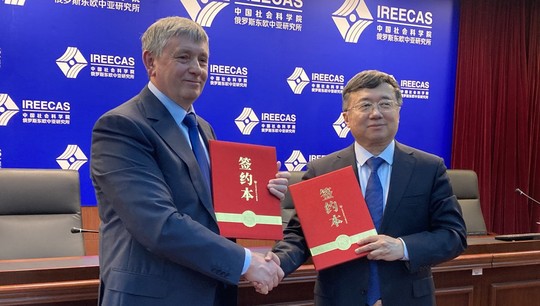UrFU and Chinese Scientists Collaborate to Counter Global Threats
The study of priority areas of cross-border interaction in the regions of Russia and China was the basis of a partnership agreement between the Ural Federal University and the Institute of Russian, Eastern European and Central Asian Studies of the Chinese Academy of Social Sciences. The document was signed by Victor Koksharov, the rector of UrFU, and Sun Zhuangzhi, the director of the Institute. ]
“Our cooperation will be devoted to promoting the implementation of the state policy of economic, scientific, technical, and humanitarian cooperation between China and Russia. In particular, scientists will regularly assess the opportunities, risks, and prospects for the implementation of the Belt and Road Initiative from the perspective of its impact on the development of the economy, social sphere, and ecology of the regions of our states. Another important task is to prepare proposals for the Chinese and Russian authorities to improve cooperation between the two countries, taking into account new trends, challenges, and threats, including the development of the digital and green economy”, explained Victor Koksharov.
Victor Koksharov also suggested to the Chinese colleagues to develop cooperation within the framework of the strategic project “Human Well-Being in the Conditions of Digital Transformation”, in particular, to study the communicative behavior in the digital environment, overcoming the barriers of different social groups. Scientists from UrFU and the Chinese Academy of Social Sciences presented joint research projects with the China Research Center and the Central Asian Center on the history of Soviet and Russian-Chinese relations, the interaction between Russia, China, and Central Asian countries on the SCO platform, and the cultural and humanitarian diplomacy of the BRICS countries.
A scientific seminar was devoted to human social well-being, which was attended by the UrFU delegation on a visit to Beijing after the signing of the agreement with the Chinese Academy of Social Sciences.
“Our research on human well-being in the age of digital transformation sometimes yields paradoxical results. For example, we have found that not only mature people but also a significant part of young people are the most averse to new digital services and their introduction into human life today. To make such studies as accurate as possible, modern scientists should expand the range of analytical tools – big data, social networks, etc.”, noted Alexey Klyuev, Director of the School of Public Administration and Entrepreneurship, opening the seminar.
UrFU researchers shared with their Chinese colleagues the results of their research in the areas of food security, demographic policy, social security, and others.

